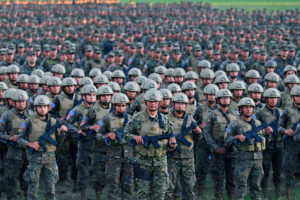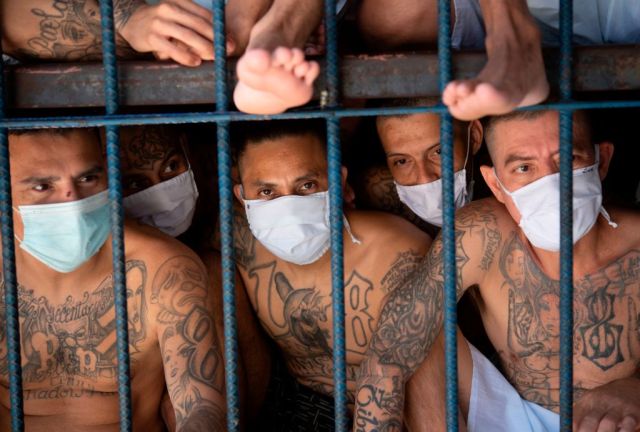Members of the MS-13 and 18 gangs in Quezaltepeque prison (YURI CORTEZ/AFP via Getty Images)

In her cramped breeze-block home on the outskirts of El Salvador’s capital, across an alley from a school currently occupied by soldiers, 65-year-old Francisca Alas rolls down her sock to show a scar from the machete of a gang member. The maras, as gangs here are known, were attacking her son, a factory worker, for refusing to pay an extortion demand. They were smashing his face in with rocks when she stood in the way and was hacked down. Shortly after the attack in 2016, her son fled to the United States, while Alas had to live with the maras operating brazenly on her street, carrying out murders, rapes and shakedowns, and deciding who could enter the neighbourhood.
This situation has radically changed since March, however, when President Nayib Bukele launched an unprecedented and brutal crackdown on gangs, involving mass imprisonment. “It’s a huge improvement,” Alas tells me, explaining that the maras on her block have disappeared. “Now we can go outside when we like. Our family can come and visit us. No president has cared about us here before.”
Alas’s comments reflect the widespread support for the anti-gang offensive and for Bukele: a December survey found 87.8% of voters approved of him, making him the most popular president on the continent, perhaps even the world. Such popularity contrasts sharply with the harsh rebuke of Bukele’s crackdown by human rights groups, journalists and members of the US Congress.
This gang offensive, though, is ruthless and violates human rights. Following a record 62 murders in a day, Bukele beseeched his legislative assembly to pass a State of Emergency on March 27, and ordered heavily-armed military units to move into the barrios — the poor neighbourhoods where most people live. “No terrorist involved in the wave of violence against the Salvadoran people will go unpunished,” Public Security Minister Gustavo Villatoro posted on Twitter, a favoured communication tool of the government. “We will take them off the street and put them behind bars.”
Since then, more than 60,000 people have been imprisoned — 1% of the entire population — adding to another 40,000 already in jail. It’s a mass incarceration comparable with some of the harshest regimes and wars in history — the equivalent of locking up more than three million in the United States in under a year.
Outside the Mariona prison, in the northern outskirts of the capital San Salvador, hundreds of family members are gathered, mostly mothers and wives, waiting to pass on packages of rice, cornflakes, soap and even prison uniforms to their loved ones. Javiera Maricela, 37, describes how police and soldiers called on her house in a farming village in April and took away her 20-year-old son, saying he would be processed and returned. She has had no contact with him since and does not know if he is still in that prison, let alone alive.
“The lack of information is torturous,” Maricela says. Like most of the detainees, her son is charged with a crime called “agrupaciones ilícitas”, roughly translated as “gang affiliation”, although it applies to those who help gangs as well as actual members. It carries a maximum sentence of 30 years, or 45 years for gang leaders.
Through a contact, I meet a prisoner who succeeded in getting his charges dropped and being released from Mariona. He describes how he was crammed into a cell with 162 inmates and the stink of faeces, had his ribs broken by guards, and frequently heard the screams of prisoners being tortured. During his month in jail, he says, he saw five corpses being carted out. Human rights groups have documented 90 deaths in prisons since the emergency was declared, although many believe the real number is much higher.
“Many of those captured are innocent,” says Samuel García, a former government official who has founded the Victims of the Regime Movement. “The families have proof but the regime doesn’t care. Bukele is very Machiavellian… What he is doing is illegal. He has broken the rule of law.”
Despite this, the crackdown remains popular and has certainly had an immense impact on reducing crime. For decades, the two main gangs, the MS-13 and Barrio 18, brazenly controlled barrios, towns and villages across El Salvador. New members committed murders as part of their initiation and continued to kill to elevate their status in their “clique”, or gang chapter. And it was not only other gangsters who were gunned down. Civilians could be murdered for simply walking on the wrong street. I recently spoke to one woman who was gang-raped when she travelled from a Barrio 18 neighbourhood where she lived to visit her mother in MS-13 turf. In the worst atrocity, in 2010, maras torched and shot up a bus killing 17 people.
I have interviewed dozens of gang members in visits over the years; you could often find them openly hanging out in the centre of neighbourhoods. But since the state of emergency, their presence has been greatly reduced: Maras are largely in prison, have fled, or are underground. The number of murders, as a result, has plummeted. Last year, El Salvador’s government reported that there were 496 homicides — a murder rate of about 8 per 100,000, which is lower than the United States for the first time on record. Back in 2015, El Salvador suffered 105 murders per 100,000, making it the most homicidal country on the planet.

“It’s like if you have a patient with cancer, the doctor has to use chemotherapy,” says Tito Elias Ponce, who works in a government agency for barrio outreach. “These criminals are like a cancer for El Salvador.” When I meet Ponce, he is working with youths painting up walls of a slum. As well as wielding the stick, Bukele offers the carrot of rehabilitating poor areas, building football pitches and community centres.
Nearby, I spot a 23-year-old soldier from the motorised infantry who has pulled over at a stand to buy pupusas, a popular Salvadoran food. The soldier claims that the troops are welcomed in the barrios and he denies that innocent people are being carted off. “Some of them may not be full gang members but they are involved in some way,” he says. “We have found messages on their phone or something. Of course, the mothers will protest. For a mother, her son is always an angel.” This claim that no innocent people are swept up seems dubious considering the sheer scale of the arrests. Detainees are stood before judges in mass closed hearings, so it is unclear how convincing the evidence is. Meanwhile, citizens are urged to inform on gang members, which could encourage people to finger anyone they have a beef with.
One reason the crackdown is so popular is that Salvadorans are fed up with gang extortion. Unlike Mexican and Colombian gangsters, maras are not big players in drug trafficking but make their money shaking down everyone from bus drivers to grocery store owners. The emergency has reduced extortion, according to reports, but lingering shakedowns remain a part of daily life. I meet a taxi driver whose base used to pay both the main gangs, but now only pays one, whose member actually drives a taxi there. “I am paying these criminals half the amount I used to,” he says “But at least that means I have more money in my pocket.”
The second reason so many Salvadorans support the offensive is more deep-rooted, a consequence of them living most of their lives in warlike conditions. Between 1980 and 1992, a civil war between a series of Right-wing US-backed governments and a Left-wing guerrilla movement tore the country apart. Young refugees largely fled to Los Angeles, where they formed gangs to protect themselves in violent inner-city neighbourhoods. And when they were deported, they turned to crime in their shattered homeland and found plenty of willing recruits among the war orphans and scarred veterans. El Salvador’s new rulers promised peace, democracy and respect for human rights. But the country was drowned in the blood of gang warfare.
Bukele, the son of a wealthy businessman of Palestinian descent, first joined the party of the former guerrillas, the Farabundo Martí National Liberation Front. I interviewed him in 2017 when he was mayor of San Salvador and he spoke of rehabilitating the barrios and rescuing young men from a life of crime. He won the presidency on a populist platform, railing against the corrupt elites, and formed his own party to smash the power of the old guard in the midterms.
By 2021, Bukele had halved the homicide count, but he is accused of doing this by reviving a truce with the gangs. According to reports by the independent news outlet El Faro, the truce gave gang leaders better treatment in prisons and allowed the gangs to carry on with their shakedowns while they dialled down the murder rate. It was only after this truce broke down with a spree of killings that Bukele launched his State of Emergency. Bukele denies this pact, though many Salvadorans I spoke to don’t care much if it is true; they simply want less violence.
Yet it remains to be seen if the drop in murders now secured by the State of Emergency will hold in the long run. The gangs may be in hiding now but they could regroup, and perhaps turn to guerrilla tactics. It is also tough and expensive to keep almost 2% of the population behind bars. To achieve this, Bukele is constructing a new mega prison, baptised the “Centre for Confinement of Terrorism”, which he claims will hold 40,000 inmates.
Meanwhile, the external criticism looks unlikely to make Bukele shift course. US Congressman James McGovern called the crackdown “draconian”, while Amnesty International warned of “a human rights crisis”. Elsewhere, the US Treasury has sanctioned several officials close to Bukele on corruption allegations, freezing their bank accounts and banning them from entering the States. But there is not much more leeway for Washington to pressure Bukele. Sanctions on Cuba, Venezuela and Nicaragua have not stopped human rights abuses there. What’s more, the idea of a return to a more interventionist US foreign policy in Latin America inspires wrath on both the Left and Right these days.
On the flip side, other Latin American governments are taking note of Bukele’s approach. Over the border in Honduras, President Ximora Castro, the country’s first female leader, has launched her own partial state of emergency to fight gangs. In Mexico, President Andrés Manuel López Obrador has largely abandoned his call for “hugs not bullets” to bolster the army.
Outside a San Salvador church, I watch a dozen mothers light candles and pray for their loved ones behind bars. They share stories, their faces full of torment from not knowing whether their sons will ever return. I wonder if support for this mass incarceration shows a tyranny of the majority, and these are the victims. Or if the benefits could outweigh the injustices. Or if one evil has simply been replaced by another evil. But the truth is, Bukele has only arisen because of a failure to deal with an immense problem of organised crime that is a central issue for most people here. And unless liberal governments in Latin America can find a better solution that works in practice, not just rhetoric, we will surely encounter more authoritarian populists and more mega prisons in the years to come.










Join the discussion
Join like minded readers that support our journalism by becoming a paid subscriber
To join the discussion in the comments, become a paid subscriber.
Join like minded readers that support our journalism, read unlimited articles and enjoy other subscriber-only benefits.
Subscribe